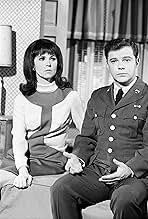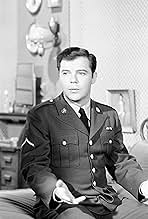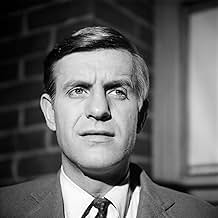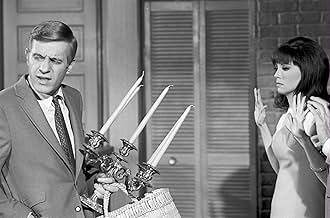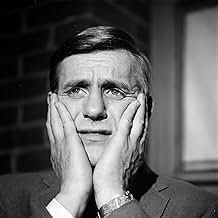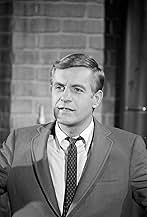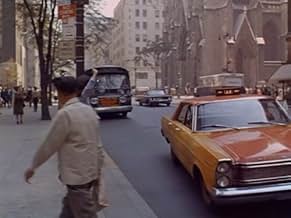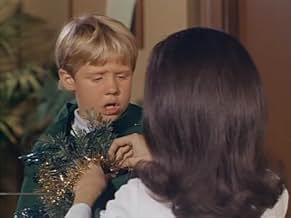An aspiring actress moves from her hometown of Brewster, New York, to try to make it big in New York City, having to take several offbeat "temp" jobs to support herself in between her variou... Read allAn aspiring actress moves from her hometown of Brewster, New York, to try to make it big in New York City, having to take several offbeat "temp" jobs to support herself in between her various auditions and bit parts.An aspiring actress moves from her hometown of Brewster, New York, to try to make it big in New York City, having to take several offbeat "temp" jobs to support herself in between her various auditions and bit parts.
- Nominated for 7 Primetime Emmys
- 3 wins & 11 nominations total
Browse episodes
Storyline
Did you know
- TriviaThe running gag of having the pre-credit sequence ending with a character referring to Ann as "that girl" was originally only supposed to be used in the pilot as it was believed that they would never be able to keep finding ways to work it into the conversation. It ended up being used in almost all the episodes.
- GoofsAnn Marie moves to New York City from Brewster, NY, which is on the Metro North Railroad's Harlem Line to Grand Central Terminal. The footage behind the credits was shot on New Jersey Transit's Northeast Corridor Line (photographed from the rear of a train leaving New York and then shown backwards so the train appears to be going to New York, although on the wrong track).
- Crazy creditsThe opening for season 1 only is not the famous train tracks, but a breathless and beautiful Ann Marie running across a NY street to a building, dressed in a pale blue coat, white gloves and shoes, white pocketbook under her arm. The train tracks don't come until seasons 2, 3, & 4, and season 5 adds lyrics to the up-tempo opening music ("Diamonds, daisies, snowflakes...").
- ConnectionsFeatured in 7 Nights to Remember (1966)
- SoundtracksMinnie the Moocher
Lyrics by Irving Mills and Clarence Gaskill
Music by Cab Calloway
Performed by Lew Parker
Featured review
... or if not that, Ted Bessell as one of the most sexually frustrated men of 1960's New York City. If the Mary Tyler Moore show had first aired in 1966 instead of 1970, it would have been this show. American culture changed that quickly. Marlo Thomas plays a young woman, Ann Marie, from the village of Brewster, New York who comes to the big city to become an actress, which is a tough career to break into, thus she takes a series of quirky jobs to get by which often become the central theme of certain episodes. In the very first episode she meets Donald (Ted Bessell), a writer for a magazine, and they are a couple for the next five years, a couple that - apparently - never has sex.
Back home, Ann's dad (Lew Parker) never quite trusts Donald's intentions with his daughter, and believes that girls should live at home until married. Thus a mainstay of the show is dad bursting in on Ann and Donald, either incidentally or intentionally, only to find them in what appears to be a compromising position (Ah ha! I've got him!) that in the end has a logical and platonic explanation.
If you didn't live through this period in history, you might think of the 1960's and believe it was nothing but an endless parade of hippies, pot smoking, and student/police confrontations over the Vietnam War. The fact is, most people in 1960's America were still living in the 1950's at the time, and women were still largely accepted only in traditional professions - teaching, nursing, secretarial work, acting - you know, jobs that involve either serving men or children. So That Girl was about as far as network TV could go with this topic - a young woman living in her own apartment pursuing a career in ANYTHING in New York City - without raising middle class eyebrows.
It was bright, funny, and innocent, sometimes to the point of being naive, but I'll always look back fondly on "That Girl" of my youth.
Back home, Ann's dad (Lew Parker) never quite trusts Donald's intentions with his daughter, and believes that girls should live at home until married. Thus a mainstay of the show is dad bursting in on Ann and Donald, either incidentally or intentionally, only to find them in what appears to be a compromising position (Ah ha! I've got him!) that in the end has a logical and platonic explanation.
If you didn't live through this period in history, you might think of the 1960's and believe it was nothing but an endless parade of hippies, pot smoking, and student/police confrontations over the Vietnam War. The fact is, most people in 1960's America were still living in the 1950's at the time, and women were still largely accepted only in traditional professions - teaching, nursing, secretarial work, acting - you know, jobs that involve either serving men or children. So That Girl was about as far as network TV could go with this topic - a young woman living in her own apartment pursuing a career in ANYTHING in New York City - without raising middle class eyebrows.
It was bright, funny, and innocent, sometimes to the point of being naive, but I'll always look back fondly on "That Girl" of my youth.
Details
- Release date
- Country of origin
- Language
- Also known as
- Miss Independence
- Filming locations
- Downtown Manhattan Heliport, Manhattan, New York City, New York, USA(Closing theme; Seasons 2 thru 5)
- Production company
- See more company credits at IMDbPro
Contribute to this page
Suggest an edit or add missing content







